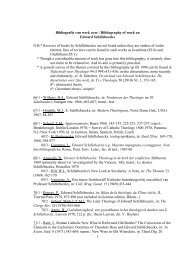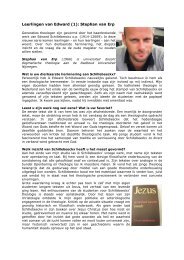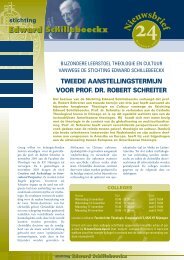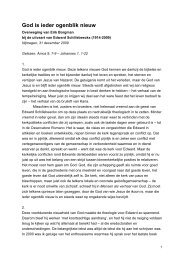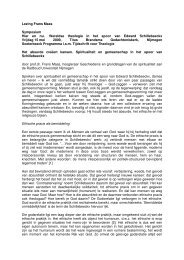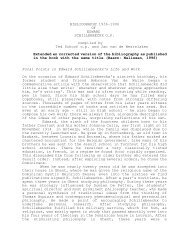Hans Hamers - Stichting Edward Schillebeeckx
Hans Hamers - Stichting Edward Schillebeeckx
Hans Hamers - Stichting Edward Schillebeeckx
Create successful ePaper yourself
Turn your PDF publications into a flip-book with our unique Google optimized e-Paper software.
example of this participating. <strong>Schillebeeckx</strong> ascribes a creative and productive force to this<br />
suffering, a force for reaching to human righteousness.<br />
In mentioning this productive and creative force the theme of this paper evolves more<br />
specific. We may ask now: how might that creative and productive force look like? How<br />
does this force work within the framework of the anthropological constants? And, after all,<br />
what might be the significance for the practice of spiritual care?<br />
Suffering does not come from God, says <strong>Schillebeeckx</strong>. In fact, God is concerned to remove<br />
suffering. But historically, in Christianity, suffering has been connected with redemption<br />
and salvation, in the sense that suffering leads in a way to redemption and salvation, the final<br />
perfection. But freedom comes also into play: man has the freedom to do good, the opposite<br />
of causing suffering to others. <strong>Schillebeeckx</strong> considers: redemption is therefore a freedom<br />
that is freed for doing good. God places man’s freedom in a saving perspective. After all, he<br />
stresses: “it is better to have known human existence than not” a kind of delight in ‘being a<br />
man’, despite everything. 17 Actually <strong>Schillebeeckx</strong> gives a Christian base for spiritual care<br />
on the base of being human, and the place suffering has in it. He presents an example of<br />
Augustine, of the friend who died and the situation of not having an answer, even “Trust in<br />
God” was not an answer. Christians should not think away the reality of suffering. It is an<br />
essentially Christian conception that suffering is not a mere illusion, and it should not be<br />
reduced to it. So suffering is an existential, human experience, and therefore man has a<br />
profound right to speak about it. <strong>Schillebeeckx</strong> connects this human based starting point<br />
with the conclusion that only God can bring salvation to man, because of the fact that man is<br />
God’s creation for the good and happiness. 18<br />
Critical force of suffering<br />
<strong>Schillebeeckx</strong> interprets the way Christian faith can help people to get along with or bear<br />
suffering: “People do not argue against suffering, but tell a story and make statements on<br />
the basis of experience without giving an ‘explanation’: simply because as Christians they<br />
look to the suffering and death of Jesus. It must have a meaning, even if no one knows how<br />
or why; the essential presupposition is that suffering should not be made [unreadable] 19 of.<br />
Faith in Jesus as Christ is an ‘answer’ without arguments, a ‘nevertheless’. Christianity<br />
does not give any explanation for suffering, but demonstrates a way of life. Suffering is<br />
destructively real, but is does not have the last word. Christianity seeks to hang on both<br />
elements: no dualism, no dolorism, no theories about illusion – suffering is suffering and<br />
inhuman -, however there is more, namely God, as he shows himself in Jesus Christ. 20<br />
17 Ibid. p. 697<br />
18 Ibid. p. 698<br />
19 ‘Unreadable’ due to a poor photocopy. The Dutch text uses the word ‘bagatelliseren’<br />
20 <strong>Schillebeeckx</strong>, E., pp. 698-699<br />
7



